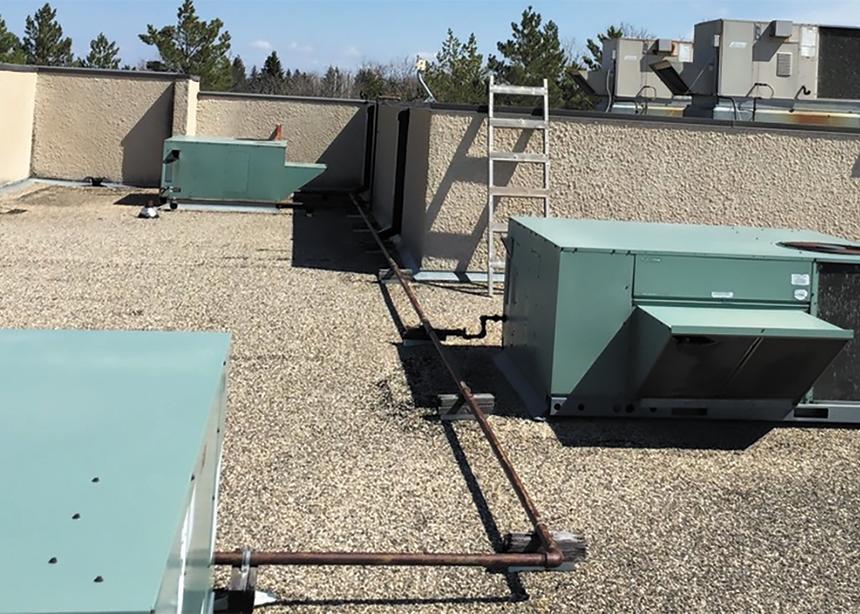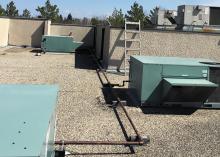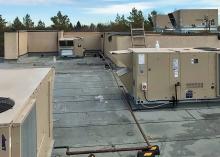Mennonite Church Canada is backing up the establishment of a new Sustainability Leadership Group (SLG) with a $220,000 upgrade to its head office in Winnipeg.
The goals of the new group were approved by MC Canada’s Joint Council in January 2020. Based on a report to Joint Council in October, the volunteer group will make suggestions to improve sustainability of programs and ministries across MC Canada.
Tim Wiebe-Neufeld, MC Alberta’s area church minister and one of the driving forces behind the initiative, describes a two-prong approach. One is a focus on operations and activities of MC Canada; the other is a focus on animating congregations to take action.
The nationwide church office is leading the way. In early December, MC Canada wrapped up a renovation project that will improve the energy performance of its headquarters in Winnipeg. The building also houses Mennonite Church Manitoba. According to Doug Klassen, MC Canada’s executive director, five 30-year-old HVAC units were replaced with units that are about 20 percent more efficient in their task of heating, ventilation and air conditioning.
At the same time, MC Canada replaced the roof, with substantial upgrades to the insulation (up to about R40) and a vapour barrier. Roofing materials with a longer life were chosen, thus reducing lifetime waste.
While Klassen says additional insulation makes financial sense, it is also “a matter of principle.”
The cost of the project is expected to come in at about $220,000, with MC Manitoba covering 40 percent.
Klassen says the next phase of the project is to install programmable thermostats for the electric baseboard heaters found in various parts of the building, in order to reduce energy used for heating overnight and on weekends. The building also needs new siding, and that would be an opportunity to improve insulation and energy performance.
Wiebe-Neufeld notes that, while many energy retrofits make financial sense in the long term for a congregation or regional church, they still require significant up front capital. He would love to see the creation of a fund that could fill that gap.
In addition to buildings, he says the SLG hopes to introduce practices for measuring and tracking environmental performance, to provide congregations with resources that will make it easier for them to take practical steps, and to look at ways to reduce the impacts of MC Canada meetings and nationwide gatherings.
While decisions have yet to be made, Klassen expects virtual meetings over Zoom to be part of the 2022 national gathering. This would accommodate both people who would like to be there but can’t, as well as those who want to avoid the impact of travel. The logistics of serving as a delegate remotely are an outstanding question.
Klassen also expects MC Canada to look at the frequency of in-person meetings of Joint Council and the Executive Staff Group. The Canadian Council of Churches and the Evangelical Fellowship of Canada already conduct half their national meetings online.
Klassen also notes that the executive office travel budget has been significantly trimmed, not only because of the pandemic.
As for motivation, Wiebe-Neufeld links environmental responsibility to care for others. He notes that environmental impacts are often felt most acutely by people who are already disadvantaged. He links it to the church’s calling to care for the vulnerable.
He would like to see faith compel people to do more than they would otherwise, going beyond what everyone else already does. He says his vision is that the church would be “willing to be vulnerable in a practice that moves us toward a better way of being.”
In addition to Wiebe-Neufeld, other current SLG members are Joanne Moyer, Caleb Gingrich Regehr, Jess Klassen, Henry Krause and Allan Hiebert.
The group is scheduled to meet again in January.
Klassen says the hope is for sustainability groups to emerge in each regional church.





Add new comment
Canadian Mennonite invites comments and encourages constructive discussion about our content. Actual full names (first and last) are required. Comments are moderated and may be edited. They will not appear online until approved and will be posted during business hours. Some comments may be reproduced in print.